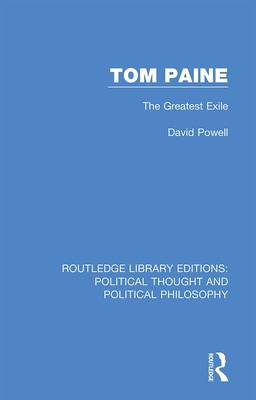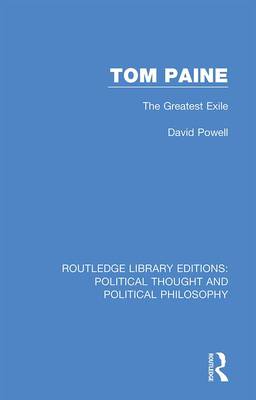
- Retrait gratuit dans votre magasin Club
- 7.000.000 titres dans notre catalogue
- Payer en toute sécurité
- Toujours un magasin près de chez vous
- Retrait gratuit dans votre magasin Club
- 7.000.0000 titres dans notre catalogue
- Payer en toute sécurité
- Toujours un magasin près de chez vous
Tom Paine
The Greatest Exile
David PowellDescription
First published in 1985. In the late autumn of 1774 at the age of 37 Tom Paine arrived in Philadelphia. Eighteen months later he had established himself as a seminal figure in the Independence movement. It was the start of a career in which he became the first US Secretary of State for Foreign Affairs; was outlawed from England by Pitt for the publication of the second part of the Rights of Man; delivered a final plea for the life of Louis XVI in the National Convention of 1794; was imprisoned in the Luxembourg, and sentenced to death by Robespierre. After a sad and lonely death in New Rochelle Cobbett brought back his bones to England: 'to light a taper for liberty.'
Yet Paine remains a man without a past; a man who seemingly burst on the world scene as a full-blown radical at 37 years of age. No one had attempted to explore and interpret the critical, shaping influences of his early and middle life. Yet such background is crucial to explaining all the rest. Without a clear understanding of his Quaker inheritance; of his childhood years in Thetford; of his early philosophical and political apprenticeship in London; and of the six formative years he spent at Lewes, the later man and his radicalism are totally incomprehensible.
Thus, the author's objective is to place Paine in his times; to interpret the evolution of his political, social and theological ideas. Paine is little more than a cardboard cut-out moving through history in the majority of biographies that have already been published.
This book sees the world through Paine's own eyes and provides a human interpretation not only of 'the Age of Revolution' but also of 'the maker of revolutions' himself. To Napoleon, Paine was the man to whom: 'a statue in gold should be erected in every town'; to Theodore Roosevelt he was 'that filthy little atheist'; to Michael Foot: 'the greatest exile that has ever left England's shores.' To understand the thinking of a man who can provoke such reactions, it is necessary to understand both the man and the times through which he lived. This title will be of great interest to students of history, politics, and philosophy.
Spécifications
Parties prenantes
- Auteur(s) :
- Editeur:
Contenu
- Nombre de pages :
- 322
- Langue:
- Anglais
- Collection :
- Tome:
- n° 47
Caractéristiques
- EAN:
- 9780367271336
- Date de parution :
- 04-12-19
- Format:
- Livre relié
- Format numérique:
- Genaaid
- Dimensions :
- 140 mm x 216 mm
- Poids :
- 517 g

Les avis
Nous publions uniquement les avis qui respectent les conditions requises. Consultez nos conditions pour les avis.






